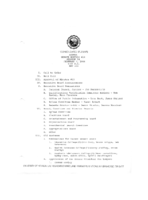Search the Special Collections and Archives Portal
Search Results

Interview with Harold David Cunningham, March 11, 2004
Date
Archival Collection
Description
Text

Interview with Julia Occhiogrosso, June 17, 2004
Date
Archival Collection
Description
Text

Interview with George Robert Maynard, Sr., February 16, 2005
Date
Archival Collection
Description
Text

Meeting minutes for Consolidated Student Senate, University of Nevada, Las Vegas, February 7, 1984
Date
Archival Collection
Description
Text
Katherine A. Spilde Papers on Native American Gaming
Identifier
Abstract
The Katherine A. Spilde Papers on Native American Gaming include materials collected by anthropologist Katherine Spilde about Native American gaming and the greater gaming industry. The materials date from 1789 to 2015, with the bulk of materials dating from 1995 to 2010. Materials dating from the eighteenth and nineteenth centuries are reproductions of key court opinions and treaties concerning Native American rights and sovereignty. The majority of the materials document Native American gaming following the passage of the 1988 Indian Gaming Regulatory Act (IGRA). The papers detail Native American gaming enterprises both on and off reservations, the socioeconomic impact of gaming, and the legislative history of Native American gaming in the United States. The papers include research and subject files created by Dr. Spilde during her employment with the National Gambling Impact Study Commission (NGISC), the National Indian Gaming Association (NIGA), and the Harvard Project on American Indian Economic Development (HPAIED). The collection includes socioeconomic reports; testimonies; correspondence; memos; press releases; photographs; audiovisual materials; promotional materials from casinos and tourist attractions; brochures; fact sheets; summaries; booklets; pamphlets; advertisements; tourism materials; journal articles; legal briefs; legislative documents; court opinions; Dr. Spilde’s notes; presentations; packets, agenda, schedules, and itineraries from conferences; periodicals; Native American and community newspapers; and newspaper articles. The collection includes materials about over one hundred federally recognized Native American nations. Also included are materials that document the socioeconomic impact of gaming, the international gaming industry, criminal activities related to gaming, advertising about gaming and casinos, lotteries, internet gaming, compulsive gambling, and bankruptcy as a result of gambling.
Archival Collection

Fernando Romero oral history interview: transcript
Date
Archival Collection
Description
Oral history interview with Fernando Romero conducted by Laurents Bañuelos-Benitez on October 2, 2018 for the Latinx Voices of Southern Nevada Oral History Project. Barbara Tabach also participates in the questioning. Fernando Romero was born in El Paso, Texas in a musical home. His father and brother were avid music players, and his brother left El Paso to play in orchestra in Las Vegas. Despite not being as passionate about music as the rest of his family, music was Romero's ticket to higher education. Romero attended University of Nevada South before it was renamed University of Nevada Las Vegas. Romero has gone on to be deeply involved in the Las Vegas community. He is the current president of Hispanics in Politics. Subjects discussed in this interview include: Hispanics in Politics, Nevada Association of Latin Americans, and education.
Text

Transcript of interview with Judge Lee Koury by Claytee White, February 6, 2013
Date
Archival Collection
Description
Born in 1932 and raised in Los Angeles; mother was a housewife and later became a painter; mention of Olvera Street; Pio Pico first Mexican governor of California; Pico House; member of the Army; Deputy Sheriff; Mother Pauline Brown and father Lee Koury; Los Angeles County Sharon Tate; LaBiancas; Spahn Ranch; "the three girls on the comer" - Lynette Fromme, Sandra Good, and Nancy Pitman; Family - referring to the Manson case - Charles Mason, Robert Beausoleil, Susan Atkins, Steve Dennis Grogan, Patricia Kernwinkle, Mary Theresa Brunner, Bruce McGregor Davis, and Leslie VanHawten; Shorty Shay the person in charge at Spahn Ranch; mention of Polaroids mailed to prisoners that ended up being an important part of the Manson case.
Text

Transcript of interview with Ron Lawrence by Dennis McBride, June, July and August 1997
Date
Archival Collection
Description
Ron Lawrence is one of the busiest people in the gay community, so I want him to know how much I appreciate his reserving time for me so that I could complete this oral history interview. The importance of his work toward the well-being of the gay community in Las Vegas cannot be measured, and much of what he's accomplished and otherwise made possible will live long after he leaves us. With Ron's consent to this interview, our knowledge of Nevada's gay history is greatly enriched and our record preserved.
Text

Transcript of interview with Patricia Mulroy by Stefani Evans and Claytee D. White, January 03, 2017
Date
Archival Collection
Description
Patricia Mulroy served Las Vegas as the general manager of the Las Vegas Valley Water District from 1989 to 2014. She served the state of Nevada as the general manager of the Southern Nevada Water Authority from 1993 to 2014. Patricia helped to build the Authority, and saw the state through the devastating drought of the Colorado River. Patricia was born in Frankfurt, Germany on February 24, 1953. As a young girl, she lived in several different countries, but always felt that the United States was her home. Her experiences abroad fed her to develop a fascination with government work and state service. She arrived in Nevada in 1974 to attend UNLV. In 1989, Patricia became the general manager of the Las Vegas Valley Water District. She entered the field at a tumultuous time, facing the drought of the Colorado River and tension within the districts. She pioneered the Water Authority, which revolutionized Southern Nevada’s water rights system and allowed the districts to deal with the issue cooperatively. She worked with other Southwestern states and Mexico to support Las Vegas and Nevada through the drought. Patricia retired in 2014, but has chosen to remain active in politics and business. She is currently working with the World Bank in China on the World Economic Forum. She is also a nonresident Senior Fellow at the Brookings Institute, a faculty advisor for the Desert Research Institute, and a board member of the Wynn Board of Directors.
Text

Myron Martin and Don Snyder interviews, November 30, 2017, December 06, 2017, and March 08, 2018: transcript
Date
Archival Collection
Description
Part 1: Interviewed by Stefani Evans. Myron G. Martin, President and CEO, and Donald D. Snyder, Chairman of the Board of Directors, share their memories of the founding of The Smith Center for the Performing Arts from the first non-for-profit foundation formed in 1996. The second iteration led by Snyder in 1999 brought in Martin--former Director of UNLV Performing Arts Center--and created a sustainable business plan for a center for the performing arts that would be accessible geographically and culturally for all segments of Nevada society. Here, Martin and Snyder recall how land, funding, and legislation for The Smith Center depended on the ""power of the project"" and the Snyder-Martin team's ability to overcome skeptics in the public, the Nevada Legislature, the Clark County Commission, the Las Vegas City Council, and the Don Reynolds Foundation. Martin and Snyder satisfied the various requirements for each organization and earned unanimous approval at each stop--in fact, the $50 million donation to The Smith Center was the largest the Don Reynolds Foundation had ever granted largest. That the approvals came on three consecutive days from competing municipal jurisdictions makes the accomplishment even sweeter. Subjects: Las Vegas, NV; Cultural center; Performing arts; The Smith Center for the Performing Arts; The Smith Center; Not-for-profit;; Nevada Legislature; Clark County Commission; Las Vegas City Council; The Don Reynolds Foundation; Fundraising; Planning; Endowment; Part 2: Interviewed by Stefani Evans. Martin, who was the youngest of three boys raised in suburban Houston, Texas, likes to say that in college at the University of North Texas he played for the Atlanta Braves and the Texas Rangers. So he did--as the organist. He earned a Bachelors of Music in piano, organ, and voice and an MBA from Golden Gate University. He came to Las Vegas after a fifteen-year career with the Baldwin Piano Company as executive director of the Liberace Foundation; he later became president of UNLV?s Performing Arts Center and in 1999 he became president of the Las Vegas Performing Arts Center Foundation. Here, Martin and Snyder recall the process whereby they hired architect David Schwarz of Washington, DC, to create The Smith Center's ""timeless, elegant"" look; creating a ""shared vocabulary"" by visiting 14 performing venues in 5 European countries; the City of Las Vegas's RFP that resulted in hiring Whiting-Turner Contracting Company; the exterior art/artists, significance of the bell tower, Founding Fifty(seven), and the ability of the theater to adapt from staging The Book of Mormon to staging a community funeral for two slain police officers. Subjects: The Smith Center; The Smith Center for the Performing Arts; Architecture; Fundraising; Acoustics; Public private partnerships; Request for proposals; Whiting-Turner; Theater Projects Group; vocabulary; Part 3: Interviewed by Stefani Evans. Author Jack Sheehan, joining this third session on The Smith Center in his role as Don Snyder's biographer, explains the way he envisions the place of The Smith Center in the larger context of Las Vegas. Martin and Snyder provide names for the group that grew out of the Call to Action meeting and founded the original Las Vegas Performing Arts Foundation. They share anecdotes of a 2005 trip, wherein they were joined by Las Vegas City Councilman Lawrence Weekly, City of Las Vegas Mayor Oscar Goodman, and consultant to the City of Las Vegas Dan Van Epp to visit City Place and the Kravis Center for Performing Arts in West Palm Beach as an example of a place where a performing arts center was a catalyst for revitalization in an area of underused and underutilized urban land. They discuss opening night, March 10, 2012, /From Dust To Dreams: Opening Night at the Smith Center For The Performing Arts/, which was produced broadcast live on national Public Broadcasting System (PBS) television stations, produced by George Stevens Jr. and directed and produced by Michael Stevens for The Stevens Company; hosted by Neil Patrick Harris; and featuring Jennifer Hudson, Willie Nelson, Merle Haggard, Emmylou Harris, Martina McBride, Carole King, Arturo Sandoval, Joshua Bell, Mavis Staples, Pat Monahan; American Ballet Theater dancers Marcello Gomes and Luciana Paris; also Broadway performers Brian Stokes Mitchell, Laura Osnes, Cheyenne Jackson, Sherie Rene Scott, Montego Glover, and Benjamin Walker. Martin describes how provisions of Nevada SB235--introduced March 6, 2017, signed into law by Governor Bob Sandoval, and became effective October 1, 2017--for the regulation of ticket sales to an athletic contest or live entertainment event affect The Smith Center ticket sales. They talk of providing 3,600 good construction jobs during the recession, of Discovery Childrens Museum, of future development plans for the entire 61-acre Symphony Park parcel, and of a second capital campaign to increase the endowment to $100 million to enable The Smith Center to be economically sustainable.
Text
